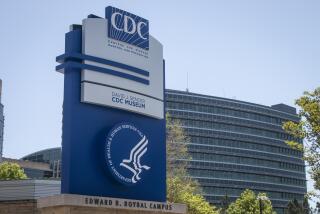As global AIDS conference nears, advocates say: Focus on the U.S.
WASHINGTON — Shortly after his partner died in 1986, Cornelius Baker found out he was HIV-positive. While AIDStook the lives of thousands in the U.S., Baker was fortunate enough to receive steady healthcare. At age 50, he still lives a relatively healthy life.
“There was a one-year period where I wasn’t employed and I paid $2,000 a month for my meds,” said Baker, a policy advisor for the National Black and Gay Men’s Advocacy Coalition. “I had the luxury of being able to do that. There aren’t many people in our society that do.”
In two weeks, Washington, D.C., will welcome 25,000 delegates to the first International AIDS Conference in the United States in 22 years; there, they’ll discuss scientific advances and strategies to combat AIDS globally.
But Baker and other advocates say the U.S. should focus on the AIDS epidemic at home.
At a forum Tuesday sponsored by AIDS In America -- a coalition of national and regional U.S. HIV/AIDS federal policy advocacy organizations -- Baker and other AIDS advocates called on federal and state governments to expand resources for education, prevention, testing and treatment in order to end AIDS in the U.S.
In the 31 years since AIDS was first recognized, life-saving drugs have made HIV a manageable disease — for those who can afford medication.
Still, 1.2 million Americans are HIV-positive and the rate of new infections has held steady for roughly a decade. Each year, 50,000 people contract HIV in the U.S., and about 20% of infections go undiagnosed, according to the federal Centers for Disease Control and Prevention.
In 2010, the Obama administration put forth a National HIV/AIDS Strategy, seeking to increase education and access to care and to reduce outbreaks and health disparities; the disease disproportionally affects gay men, minorities and the poor.
Yet federal and state funding have not kept pace with the need, said Julie Scofield, the executive director of the National Alliance of State and Territorial AIDS Directors.
The CDC estimates that only 40% of people in the U.S. infected with HIV are getting continued healthcare. Further, 2,000 people in nine states remain on waiting lists for AIDS Drug Assistance Programs, which provide medication to low-income Americans with HIV/AIDS.
Many proposals for improving prevention and care — such as lifting a federal ban on funds for clean syringes and ending abstinence-only education — remain controversial.
The expansion of Medicare and Medicaid in President Obama’s Affordable Health Care Act, could benefit the more than 50% of HIV patients who receive treatment through Medicare and Medicaid, said Ronald Johnson, of AIDS United. But several Republican governors have promised not to expand Medicaid programs, following the Supreme Court’s ruling allowing states to opt out of the Affordable Care Act’s Medicaid expansion.
Still, with the International AIDS Conference coming to the nation’s Capitol, Carl Schmid, deputy executive director at the AIDS Institute, hopes for a renewed focus on combatting AIDS.
“Society has turned its attention away from this epidemic,” Schmid said. “With more HIV in our country than ever before, it is imperative that we raise our country’s consciousness.”
ALSO:
Woodchucks nailed in mysterious theft of flags from graveyard
NTSB report: Enbridge’s response to Michigan oil spill was ‘poor’
Man’s 7th DUI involved collision, teen passengers -- and a judge
jamie.goldberg@latimes.com
More to Read
Sign up for Essential California
The most important California stories and recommendations in your inbox every morning.
You may occasionally receive promotional content from the Los Angeles Times.










